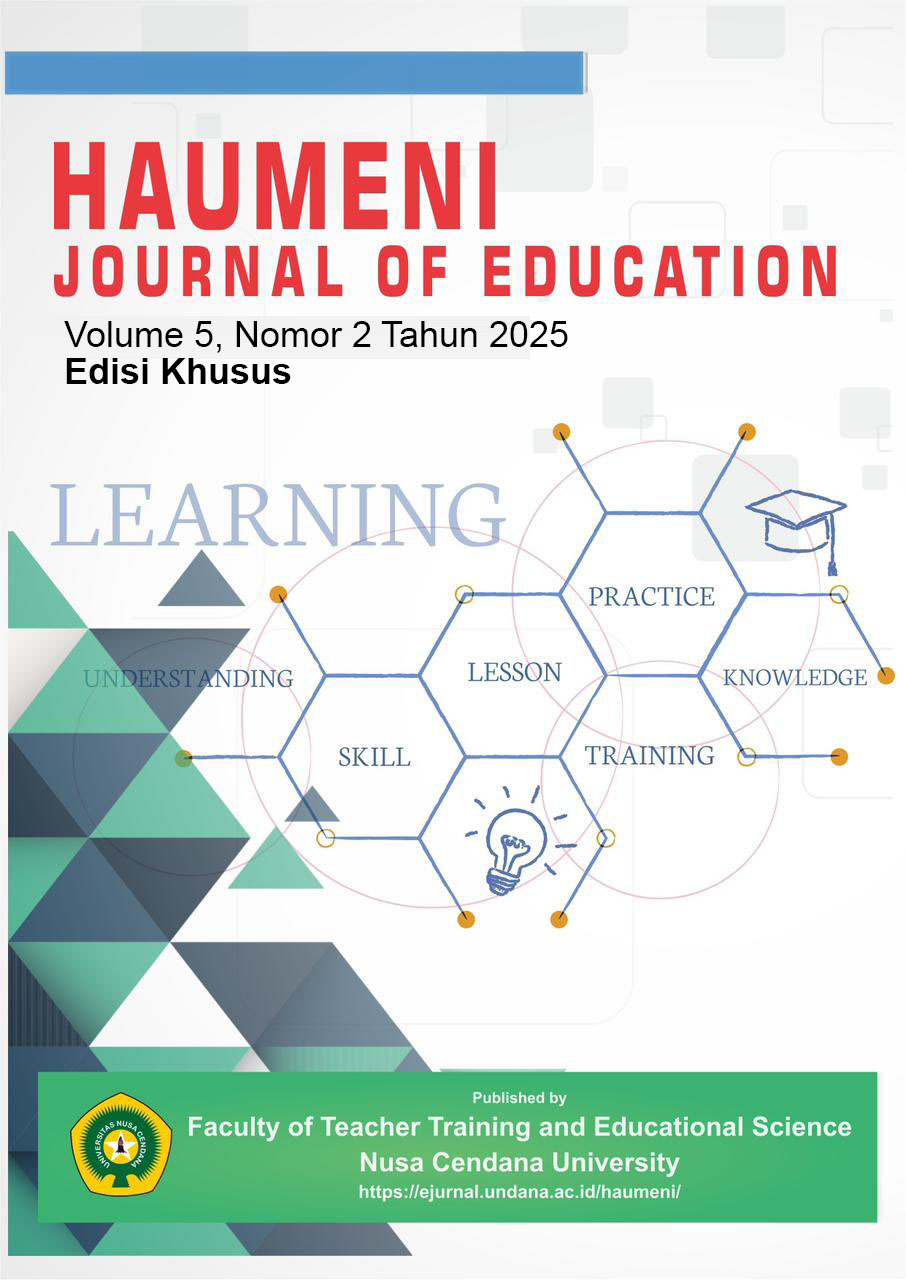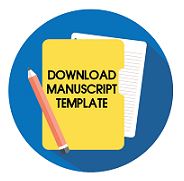PEMANFAATAN TEKNOLOGI ARTIFICIAL INTELLIGENCE DALAM MENUNJANG EFEKTIVITAS PEMBELAJARAN MAHASISWA UNIVERSITAS NUSA CENDANA DI ERA SOCIETY 5.0
Abstract
This study examines the role of Artificial Intelligence (AI) technology in supporting the learning effectiveness of students at the University of Nusa Cendana in the Society 5.0 era. The background of this research is based on the importance of integrating intelligent technologies into higher education to create learning that is more adaptive, effective, and personalized. The purpose of this study is to determine the extent to which AI is used by students and how it impacts learning effectiveness. The method employed is descriptive quantitative, with data collected through an online questionnaire involving 76 active students. Data analysis was conducted using descriptive statistics to identify usage patterns and students' perceptions of AI. The results show that 98.7% of students have used AI, with 38.2% using it daily and 53.9% several times a week. These findings conclude that AI is a beneficial learning tool, but not a substitute for educators
Downloads
References
Bureni, E. N., Daro, K., Khotimah, K., Wandal, Y. R. L., Radja, D. C. L., & Mas’ud, F. (2025). Pembinaan Etika Siswa Melalui Pembelajaran PPKn di SMA Negeri 1 Amarasi Barat. Jimmi: Jurnal Ilmiah Mahasiswa Multidisiplin, 2(2), 221-234.
Chen, Y., Li, X., Liu, J., & Ying, Z. (2018). Recommendation System for Adaptive Learning. Applied Psychological Measurement, 42(1), 24–41. https://doi.org/10.1177/0146621617697959
Fajriati, A., Wisroni, W., & Handrianto, C. (2024). PEMANFAATAN TEKNOLOGI ARTIFICIAL INTELLIGENCE (AI) DALAM PEMBELAJARAN BERBASIS PESERTA DIDIK DI ERA DIGITAL.
Kale, D. Y. A., Mas' ud, F., Nassa, D. Y., & Doko, M. M. (2025). Pengembangan Media Pembelajaran Berbasis Canva Pada Materi Kebinekaan Indonesia Kelas VII DI SMP Muhammadiyah Kupang. Haumeni Journal of Education, 5(1), 1-8.
Kasneci, E., Sessler, K., Küchemann, S., Bannert, M., Dementieva, D., Fischer, F., Gasser, U., Groh, G., Günnemann, S., Hüllermeier, E., Krusche, S., Kutyniok, G., Michaeli, T., Nerdel, C., Pfeffer, J., Poquet, O., Sailer, M., Schmidt, A., Seidel, T., … Kasneci, G. (2023). ChatGPT for good? On opportunities and challenges of large language models for education. In Learning and Individual Differences (Vol. 103). Elsevier Ltd. https://doi.org/10.1016/j.lindif.2023.102274
Lukman, Riska Agustina, & Rihadatul Aisy. (2023). 826-Article Text-2953-2-10-20240220 (2).Marlin, K., Tantrisna, E., Mardikawati, B., Anggraini, R., Susilawati, E., Proses, T., Etika, P., Mahasiswa, K., Perguruan, D., Khairul, T., 1✉, M., Uin, ), Yunus Batusangkar, M., Transportasi, P., & Bali, D. (2023). Manfaat dan Tantangan Penggunaan Artificial Intelligences (AI) Chat GPT Terhadap Proses Pendidikan Etika dan Kompetensi Mahasiswa Di Perguruan Tinggi.
Mas’ud, F., Jeluhur, H., Negat, K., Tefa, A., Uly, M., & Amtiran, M. (2025). Etika Dalam Media Sosial Antara Kebebasan Ekspresi Dan Tanggung Jawab Digital. Jimmi: Jurnal Ilmiah Mahasiswa Multidisiplin, 2(2), 235-246.
Mas' ud, F., & Istianah, A. (2025). Ekosistem Digital Dan Narasi Kebangsaan: Relevansi Pancasila Sebagai Penuntun Etika Publik Virtual. Haumeni Journal of Education, 5(1), 18-26.
Miller, D., Day, J., Ruiz, S., & Tafazzoli, M. (n.d.). Using Technology as a Learning Tool: A Literature Review of Technology and Learning Outcomes.
Nassa, D. Y., Mas’ud, F., Nitte, Y. M., & Bakoil, M. B. (2025). Pendidikan Pancasila: Menjawab Tantangan di Era Digital. Tangguh Denara Jaya Publisher.
Nurcahyani Yahya, S., Aurelia, A., Rahmatillah, F., Waruwu, S. Y., & Amelia, N. (n.d.). Pemanfaatan AI sebagai Media Pembelajaran dalam Pendidikan Ekonomi. Jurnal Disrupsi Bisnis, 7(6), 823–830. https://doi.org/10.32493/drb.v7i6.46279
Pardamean, B., Suparyanto, T., Cenggoro, T. W., Sudigyo, D., & Anugrahana, A. (2022). AI- Based Learning Style Prediction in Online Learning for Primary Education. IEEE Access, 10, 35725–35735. https://doi.org/10.1109/ACCESS.2022.3160177
Ramirez, E. A. B., & Esparrell, J. A. F. (2024). Artificial Intelligence (AI) in Education: Unlocking the Perfect Synergy for Learning. Educational Process: International Journal, 13(1), 35–51. https://doi.org/10.22521/edupij.2024.131.3
Rhamadhani, M. S., Luna, G., Ramadhani, O., Ogya, R., & Paskah, D. ’. (2024). Pemanfaatan AI (Artificial Intelligence) Dalam Menunjang Penyelesaian Tugas Perkuliahan Mahasiswa Ilmu Komunikasi Di Universitas Negeri Surabaya. In Seminar Nasional Universitas Negeri Surabaya.
Song, C., Shin, S. Y., & Shin, K. S. (2024). Implementing the Dynamic Feedback-Driven Learning Optimization Framework: A Machine Learning Approach to Personalize Educational Pathways. Applied Sciences (Switzerland), 14(2). https://doi.org/10.3390/app14020916
Sumarno, S. (2023). Integration of Digital Technology in Public Management Transformation: International Journal of Asian Education, 4(2), 115–120. https://doi.org/10.46966/ijae.v4i2.348
Syafitri, I. R., Hendra, T., & Gistituati, N. (2022). The Influence of Principal Leadership and Teacher Dicipline on Teacher Performance. Al-Fikrah: Jurnal Manajemen Pendidikan, 10(1), 27. https://doi.org/10.31958/jaf.v10i1.6007
Timms, M. J. (2016). Letting Artificial Intelligence in Education out of the Box: Educational Cobots and Smart Classrooms. International Journal of Artificial Intelligence in Education, 26(2), 701–712. https://doi.org/10.1007/s40593-016-0095-y
Yani Ahmad. (2024). society 5.0 jurnal. Journal of Education Research, 1089–1096.

 Ayu Fitriani Rizkiyah Lestari(1*)
Ayu Fitriani Rizkiyah Lestari(1*)







